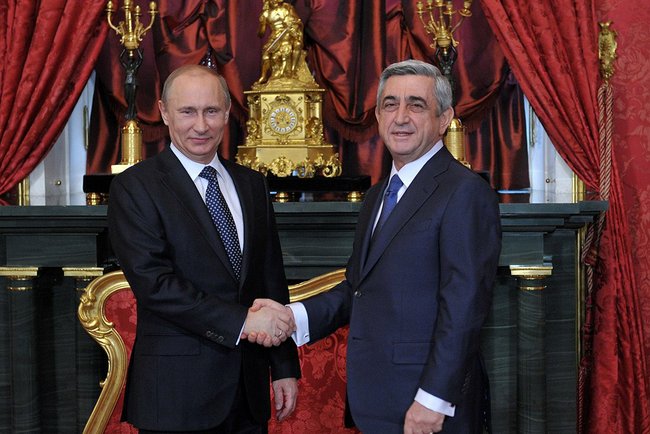Russia’s Policy Towards Armenia: Big stick and small carrot
During his meeting with President Vladimir Putin in Moscow on September 3rd President Serzh Sargsyan’s declared Armenia’s will to join the Customs Union.
September 5, 2013 -
Konrad Zasztowt
-
Articles and Commentary

CSTO_Collective_Security_Council_meeting_Kremlin,_Moscow_2012-12-19_04.jpg
This decision may undermine Armenia’s economic rapprochement with the European Union despite the fact the country accomplished its technical negotiations on the DCFTA with the EU in July. It came as a surprise not only to EU officials in Brussels, but also to many Armenian observers of Yerevan’s foreign policies. One may ask if it was a surprise for Sargsyan as well? Most probably, he didn’t intend to go so far with declarations about Armenia’s integration with economic structure. However, Putin had a number of arguments to influence the Armenian leader’s decision, the most serious of which is about the security of the Armenian Nagorno-Karabakh separatist state.
This territory officially doesn’t belong to Armenia, which means it is not protected by Russia-led Collective Security Treaty Organization (CSTO). After the Georgian attempt to reunite separatist South Ossetia in 2008, which failed because of Russian intervention, Azerbaijan has become less eager to choose military solutions to regain the lost territory of Nagorno-Karabakh. Russia’s image of the mighty protector of all post-Soviet separatist entities deterred Baku from taking actions against Armenians. Thus, even if outside of the CSTO, Nagorno-Karabakh was secure thanks to Moscow. However, it was clear that this situation may not last forever. Vladimir Putin’s Russian foreign policy resembles the old Soviet style. It is not about universal values or even Russia’s economic interest. These may be declared goals. The real goal is to maintain Russian hegemony in the former Soviet Union. Once Armenia became too self-confident in declaring its wish to integrate economically with the EU within the framework of the Eastern Partnership, Putin decided to act.
Russia heavily criticised Ukraine for selling weapons to Georgia, which it used in the 2008 war in South Ossetia. However, since July this year Russians have begun delivering tanks, artillery cannons and rocket launchers worth 1 billion US dollars to Azerbaijan, forgetting the fact that this equipment might be used in the Karabakh conflict. For the Armenian government it was a clear signal: Russia easily switches sides (like it has already done in past) and support Azerbaijan in the Nagorno-Karabakh conflict. Putin’s visit to Baku on August 13th – the first since 2006 – only fuelled Armenian leadership’s fears. Azerbaijan’s leader, Ilham Aliyev, acknowledged that his country has already spent 4 billion US dollars on Russian weapons since 2010.
Clearly, Russia has also offered Armenia a positive agenda. During Sargsyan’s visit to Moscow, Putin informed him that Russian Railways are ready to invest 15 billion Russian roubles in developing Armenia’s railway system. However, less obvious are Armenian profits from integration with the Custom’s Union. The current predicament in economic relations between Russia and Belarus, both members and founders of the organisation, reveals the illusive nature of the Moscow-led Eurasian economic structure. Therefore, the Armenian leadership should recognise main difference between the EU’s Eastern Partnership and Russia’s Customs Union proposals. The EU project’s agenda is focusing on Armenia’s internal reforms, modernisation and sustainable development. Russia’s proposal doesn’t require any reforms. However, it does demand resignation from any independent foreign policy goals, which may strengthen Armenian statehood and weaken Moscow’s influence on Yerevan.
Konrad Zasztowt is an analyst at the Polish Institute of International Affairs and specialises in the South Caucasus and Central Asia regions. Previously he worked at the National Security Bureau (2008-2010), where he monitored international security issues in the Black Sea and Caspian regions. He is a graduate of the Institute of Ethnology and Cultural Anthropology and East European Studies at University of Warsaw and also studied at Yeditepe University in Turkey (2003-2005). His areas of interest include international relations and energy security issues in the Black Sea region (Ukraine, the Caucasus, Turkey) and Central Asia, ethnic and religious minorities as well as the issue of Islam in the former Soviet Union.


































